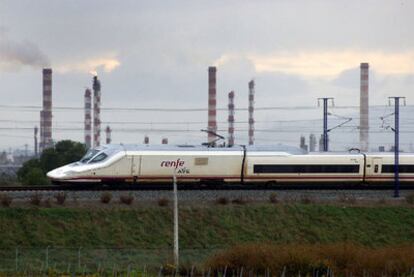Fast-track listing for Talgo?
Boosted by exports, Spanish train manufacturer mulls initial public share offer
Construcciones y Auxiliar de Ferrocarriles (CAF), Spain's leading train manufacturer, and the only listed company in the sector, may have company soon in the Spanish stock exchange. Its rival Talgo, which years back made an aborted attempt to list, is once again considering tapping the bourse for funding.
Deliberations on the issue have got to the point that Banco Santander has reportedly been hired by Talgo to pave the way for a listing with the assistance of Nomura and Credit Suisse.
Although details of the planned initial public offer are not known, the IPO is expected to be launched through a capital increase and the sale of part of the combined 75-percent stake in Talgo the private equity firms MCH and Trilantic Capital Partners (which belonged to the now famously defunct US investment bank Lehman Brothers) acquired in 2006.
Although Talgo is keeping its cards well hidden on details of the expected IPO, it believes the move is justified by the favorable prospects of the market and the company. Talgo has enjoyed some of its best years ever of late on the back of high-speed train sales to Spain's extensive and growing network, as well as overseas.
The strategic plan adopted after the entry of the private equity firms, which promotes internationalization and product diversification, has managed to turn around a company that had been suffering losses. Turnover rose from 126.9 million eurosin 2005 to 395 millioneurosin 2009 when Talgo made a profit of 74.2 million euros.
Given that demand for high-speed trains in Spain will inevitably reach saturation point, over the past five years Talgo has redoubled its efforts to expand overseas. After winning a contract to supply nine trains to Bosnia in 2006, overseas orders dried up for a few years. The situation started to pick up again in 2009, mainly for medium-speed conventional trains.
After winning a contract to supply trains to the US state of Washington several years ago, Talgo renewed its relationship with the American market, securing contracts from Oregon and Wisconsin to supply four Talgo pendular trains.
But the company's biggest marketing success in years came in Kazakhstan. Talgo will progressively supply the state-run railway in the former Soviet republic with 3,000 passenger wagons. The Spanish firm will supply 420 in the first three-year phase, a contract that will bring in some 200 million euros. Most of the wagons will be supplied from a plant currently being set up in the Kazakh capital of Astana, which is due to come on stream at the end of this year.
The lucrative Kazakh deal was not a product of chance, Talgo having supplied three trains in 2004, which continue to link Astana and Alma-Ata, the former capital and still the biggest city in Kazakhstan.
Talgo also believes its prospects are good in Russia, Saudi Arabia and Brazil, which would supplement revenues estimated at some 100 million euros from the Spanish state railway operator Renfe.
While Talgo is likely to have no problems selling itself to interested investors, according to sources in the sector, its planned IPO will not be an "easy operation," with pricing of course a key issue. The sources said reported valuations for Talgo of anywhere between 700 million euros andone billion eurosseem steep. CAF currently has a market capitalization of some 1.4 billion eurosbut its turnover of 1.576 billion euroslast year is about four times bigger than that of Talgo.
What might help Talgo's case would be if it won a contract to supply trains to the high-speed rail system being built in Saudi Arabia. However, there is expected to be stiff competition - from the French manufacturer Alstom, for example. The same goes for the bullet train line between São Paulo and Rio de Janeiro, which is due to come into operation in 2014.

Tu suscripción se está usando en otro dispositivo
¿Quieres añadir otro usuario a tu suscripción?
Si continúas leyendo en este dispositivo, no se podrá leer en el otro.
FlechaTu suscripción se está usando en otro dispositivo y solo puedes acceder a EL PAÍS desde un dispositivo a la vez.
Si quieres compartir tu cuenta, cambia tu suscripción a la modalidad Premium, así podrás añadir otro usuario. Cada uno accederá con su propia cuenta de email, lo que os permitirá personalizar vuestra experiencia en EL PAÍS.
¿Tienes una suscripción de empresa? Accede aquí para contratar más cuentas.
En el caso de no saber quién está usando tu cuenta, te recomendamos cambiar tu contraseña aquí.
Si decides continuar compartiendo tu cuenta, este mensaje se mostrará en tu dispositivo y en el de la otra persona que está usando tu cuenta de forma indefinida, afectando a tu experiencia de lectura. Puedes consultar aquí los términos y condiciones de la suscripción digital.








































